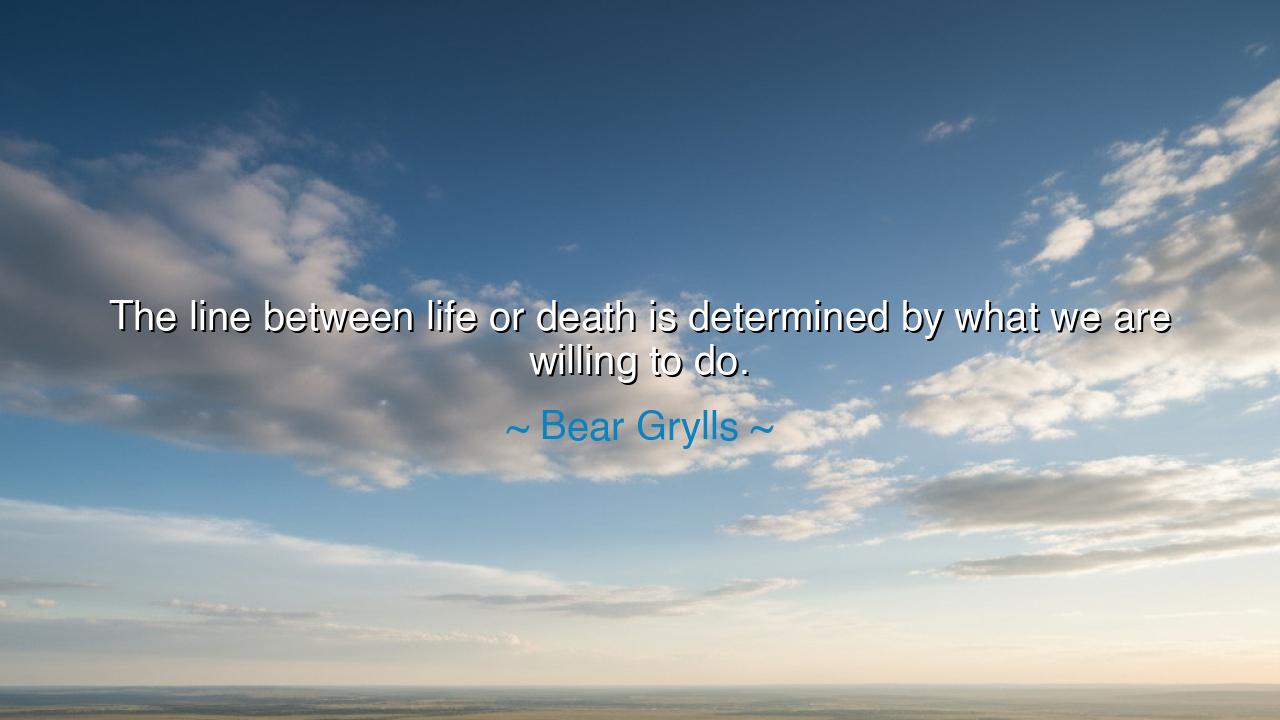
The line between life or death is determined by what we are






When Bear Grylls declared, “The line between life or death is determined by what we are willing to do,” he was not merely speaking of wilderness survival or the harsh trials of nature. He was revealing a truth as old as humanity itself — that the measure of life is not written in fate or chance, but in courage, in will, and in the actions we choose when the storm surrounds us. His words are both a warning and a call to greatness: that survival, whether in the wild or in the soul, belongs not to the strongest, but to the one who dares to act when fear whispers, “It is hopeless.”
Born from the crucible of survival, these words reflect Grylls’s life and purpose. A soldier, explorer, and adventurer, he has stared into the abyss of hunger, injury, and despair — and emerged with the wisdom of one who has faced death and learned from it. When he says that life and death are divided by what we are willing to do, he speaks not of reckless deeds, but of commitment, of the human capacity to rise above weakness and act when action seems impossible. In his experience, every rescue, every endurance, every victory begins in the same place: the mind that refuses to surrender. For while nature tests the body, the true battle is fought within.
In ancient times, the philosophers and warriors understood this same truth. The Spartans, standing against the vast Persian army at Thermopylae, did not fight because victory was certain, but because their will was stronger than their fear of death. The line between survival and annihilation was not drawn by numbers or weapons, but by resolve. As long as courage lived in their hearts, they remained unconquered. So too does Grylls remind us that life is not granted by safety or comfort — it is earned through action, through choice, through the willingness to face the unknown and say, “I will not yield.”
There is a quiet heroism in this truth that reaches beyond the battlefield or the wilderness. Every person, in their own life, stands at such lines — moments where comfort must give way to conviction, or the heart must rise above despair. Consider the story of Ernest Shackleton, the Antarctic explorer whose ship, Endurance, was crushed by ice. Stranded at the edge of the world, his men faced hunger, freezing winds, and hopeless odds. Yet Shackleton refused to let death claim them. Through unbreakable will and daring action, he led all twenty-seven men home alive. In that frozen wasteland, the line between life and death was drawn not by circumstance, but by what one man was willing to do for others.
The meaning of Grylls’s words, then, goes far beyond survival in the wild. It speaks to the inner wilderness that all people must navigate — the moments of trial where fear, doubt, and despair close in. The “line” he speaks of is not a cliff’s edge or a roaring river, but the fragile boundary in the heart between courage and surrender. To cross it into life, one must act — even when the outcome is uncertain, even when exhaustion says no, even when comfort tempts us to remain still. Life itself rewards the brave, for it was never meant to be lived safely, but boldly.
Yet Grylls’s wisdom is not reckless daring, but disciplined action born from preparation and faith. The brave do not leap blindly; they rise deliberately, trained by hardship and strengthened by experience. His words teach that when danger comes — whether it is the cold of failure, the storm of grief, or the hunger of despair — our salvation lies not in waiting, but in doing. The human spirit was built for endurance, for adaptation, for creation. What separates those who fall from those who endure is not luck, but the will to keep moving forward when the night is darkest.
So take this lesson, child of both comfort and trial: never let fear paralyze your purpose. When the storm rises around you — when the path disappears, and the way seems lost — remember that the line between life and death, success and ruin, despair and hope, lies in your hands. Act. Move. Strive. Speak when silence feels safe, climb when standing feels easy, and choose courage even when your strength feels gone. For Bear Grylls reminds us that life belongs to the willing, to those who dare to turn fear into fuel and hardship into honor. In every age, under every sky, the immortal truth remains: the line between life and death is drawn not by fate, but by the fire that burns within the human heart.






AAdministratorAdministrator
Welcome, honored guests. Please leave a comment, we will respond soon